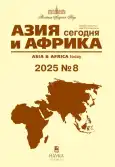The Role of Western Media in Shaping the Perception of Russia by the Population of West Africa
- Авторлар: Zing M.Y.1,2, Shishkina A.R1,2
-
Мекемелер:
- HSE University
- Institute for African Studies, Russian Academy of Sciences
- Шығарылым: № 8 (2025)
- Беттер: 31-38
- Бөлім: Politics, economics
- URL: https://stomuniver.ru/0321-5075/article/view/690664
- DOI: https://doi.org/10.31857/S0321507525080043
- ID: 690664
Дәйексөз келтіру
Аннотация
This study is aimed at assessing the role of Western media in shaping the perception of Russia by the population of West Africa. The study employed qualitative research methods. The study leveraged the data collected during the field work on the image of Russia in Africa for three years (2020–2023). Thematic analysis was employed to analyse the data gathered through the expert interviews. The thematic analysis was supported by verbal quotations from the expert interviews. The key and ground-breaking finding of this study is that there is a positive relationship between the role of Western media reporting on Russia and its influence in shaping the perception of West Africa about Russia, showing that the more the reportage of Russia by Western media, the more the likelihood of resulting to a positive image about Russia. Other key findings include the fact that USSR support and current Russia political, economic and military support in West Africa has a positive influence on people's perception of Russia. It is, therefore, imperative for Russia to strengthen and improve its relationship with Africa beyond just the military cooperation to mutually beneficial economic and infrastructural cooperation in order to maintain a long-term positive image in Africa.
Негізгі сөздер
Авторлар туралы
M. Zing
HSE University; Institute for African Studies, Russian Academy of Sciences
Хат алмасуға жауапты Автор.
Email: micah.zing@gmail.com
Post-graduate student, Faculty of Social Sciences Moscow, Russia
A. Shishkina
HSE University; Institute for African Studies, Russian Academy of Sciences
Email: alisa.shishkina@gmail.com
PhD (Political Science), Leading Researcher, Centre for Stability and Risk Analysis, HSE University; Researcher, Centre for Civilisational and Regional Studies Moscow, Russia
Әдебиет тізімі
- Bondarenko D.M. 2012. The Image of Russia in Africa: The Soviet Legacy’s Role. Proceedings of the 8th Iberian Congress of African Studies. Madrid.
- Issaev L.M., Shishkina A.R., Liokumovich Y.B. 2022. Perceptions of Russia’s ‘return’ to Africa: Views from West Africa. South African Journal of International Affairs. № 29 (4). Pp. 425–444.
- Olivier G., Suchkov D. 2015. Russia is back in Africa. The Strategic Review for Southern Africa. 37 (2). Pp. 146–167.
- Schmidt E. 2013. Foreign intervention in Africa: From the cold war to the war on terror. Cambridge University Press.
- Korendyasov E.N. 2016. The new start for Russian-African relations. Vestnik RUDN. International Relations. 16 (2). Pp. 203–214.
- Bourgault L.M. 1995. Mass media in sub-Saharan Africa. Indiana University Press.
- Coban F. 2016. The Role of the media in international relations: From the CNN Effect to the Al-Jazeere Effect. Journal of International Relations and Foreign Policy. 4 (2). Pp. 45–61.
- Boyd-Barrett O. 2016. Western mainstream media and the Ukraine crisis: A study in conflict propaganda. Routledge.
- Matusevich M. 2019. Russia in Africa. Insight Turkey. 21 (1). Pp. 25–40.
- Kamat V. 2008. This is not our culture! Discourse of nostalgia and narratives of health concerns in post-socialist Tanzania. Africa. 78 (3). Pp. 359–383.
- McCombs M., Valenzuela S. 2020. Setting the agenda: Mass media and public opinion. John Wiley & Sons.
- Roff K.L. 2013. Barbaric mistakes: Western print media’s portrayal of “ethnic” conflicts. University of Canterbury.
- Ellul J. 1973. Propaganda: The Formation of Men’s Attitudes. New York: Vintage Books.
- Lasswell H.D. 1927. The Theory of Political Propaganda. American political science review. 21 (3). Pp. 627–631.
- Ballantyne A.G. 2016. Climate change communication: what can we learn from communication theory? Wiley Interdisciplinary Reviews: Climate Change. 7 (3). Pp. 329–344.
- Payne K. 2009. Winning the battle of ideas: Propaganda, ideology, and terror. Studies in Conflict & Terrorism. 32 (2). Pp. 109–128.
- McCombs M., Reynolds A. 2002. News influence on our pictures of the world. Media effects. Routledge. Pp. 11–28.
- Sciarini P., Tresch A. 2019. The political agenda-setting power of the media: the Europeanization nexus. Journal of European Public Policy. 26 (5). Pp. 734–751.
- McCombs M. 1977. Agenda setting function of mass media. Public relations review. 3 (4). Pp. 89–95.
- Bennett W.L., Iyengar S. 2008. A new era of minimal effects? The changing foundations of political communication. Journal of communication. 58 (4). Pp. 707–731.
- McCombs M., Stroud N.J. 2014. Psychology of agenda-setting effects: Mapping the paths of information processing. Review of Communication Research. 2. Pp. 68–93.
- Giannotta V. 2023. Western Perception and Media Coverage of Türkiye’s Elections. Insight Turkey. 25 (2). Pp. 37–46.
- Branson P. 1999. Systems and Components. Electronics Education. Pp. 12–15.
- Mahadeo M., McKinney J. 2007. Media representations of Africa: Still the same old story. Policy & Practice: A Development Education Review. 4 (2). Pp. 14–20.
- Wanta W., Golan G., Lee C. 2004. Agenda setting and international news: Media influence on public perceptions of foreign nations. Journalism & Mass Communication Quarterly. 81 (2). Pp. 364–377.
- McFadden D. 1972. Conditional logit analysis of qualitative choice behavior. University of California.
Қосымша файлдар








